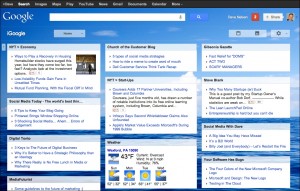Google announced recently that they will be discontinuing one of the most useful free tools on the planet. Do not panic! It’s still available until November 1, 2013, and maybe longer as this may be a simple marketing stunt to raise its visibility (arrrggh, it appears that I’ve fallen prey to their dastardly plan).

I’m talking about iGoogle and you’ve got just 12 months left to experience it. If you’re not familiar with iGoogle, your intuition is right on; it’s going to be way cooler than the regular Google — because it’s got the “i”.
iGoogle is an RSS reader (for the record, one of hundreds). Ignore the lingo and intimidating techno-speak; it’s actually easy and intuitive. Go to www.google.com/ig to sign-up. You’ll discover that iGoogle features the indispensible Google “search” box front and center, but also provides a comprehensive information dashboard — one that you build as you go.
 From now on as you surf the web, keep an eye out for the ubiquitous, orange RSS icon. You’ll find it on blogs, podcasts, YouTube videos and everything else that is serialized (including media sites such as www.nytimes.com).
From now on as you surf the web, keep an eye out for the ubiquitous, orange RSS icon. You’ll find it on blogs, podcasts, YouTube videos and everything else that is serialized (including media sites such as www.nytimes.com).
Using RSS (really simple syndication) is much like subscribing to a magazine, but in this case for web content that’s typically free. Like a magazine, whenever the next issue is available (AKA the next blog post, the next podcast, the next video episode), it comes to you automatically. RSS posts it directly to iGoogle, just like the old, reliable postman.
Once you start looking for the orange RSS button, you’ll see it’s everywhere. If the content on a given site is valuable to you, click the button and answer “yes” when asked whether you want to add it to your iGoogle desktop. Thereafter it will come automatically to you.
No new habit is required here, as most of us type www.google.com many times every day. Just tell iGoogle to “remember me”(when logging in) and every time you go to Google, iGoogle will appear with your subscribed content, neatly organized in its dashboard format.
Unlike email, iGoogle won’t overwhelm you either. Instead, it will display just the three newest pieces of content from each of your sources. And don’t feel compelled to read everything. Instead, scan the headlines and click just those of interest, letting go of the rest. Next time you return to iGoogle, your content will be renewed.
iGoogle, and more broadly RSS, is very much like a press clipping service of old. But in this case, it monitors not just press releases but also websites, blogs, Facebook pages, review sites, and even traditional media. It’s incredibly valuable.
I’m actually not worried about iGoogle disappearing. At worst, I expect Google to replace it with an even more amazing RSS reader based on Google+. So try it out and don’t worry about becoming addicted to it. In a world of accelerating change, we need tools to help us manage information. iGoogle (and whatever replaces it) is one of the keys to staying on top.

I’ve recently found and adopted a great iGoogle emulator (AKA replacement): Go to http://www.IGhome.com and try it out. I like it; let me know your opinion.
Now i am using the igooglealternatives.info for choose my best alternatives.
Thanks for recommending a great site (igooglealternatives.info). Of the Top 10 alternatives listed, I’ve adopted http://www.ighome.com. It’s an excellent replacement for iGoogle.